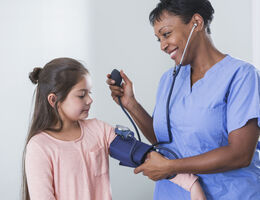
Sept. 23, 2024—Did you know that as many as 1 in 7 kids in the U.S. may have high blood pressure? Monitoring children's blood pressure as they grow helps protect their future heart and vascular health.
It's easy to think of high blood pressure (also called hypertension) as an adult problem. But it can start in childhood—and it may be more common than you'd think.
A recent study presented at the American Heart Association (AHA) Hypertension Scientific Sessions examined just how common high blood pressure is in kids. The research isn't considered final until it's shared in a peer-reviewed journal. But while nearly half of U.S. adults have high blood pressure, we don't know as much about hypertension rates in kids.
Researchers looked at blood pressure and body mass index data for 2,600 youth ages 8 to 19. They found that:
- 5.4% of kids had high blood pressure.
- 8.7% had elevated blood pressure. This means a child is at risk for hypertension.
- Levels were higher in boys and increased with age.
- Youth with severe obesity were more likely to have hypertension.
Check in at your child's checkup
High blood pressure doesn't usually cause symptoms. So monitoring it in people of all ages is important. Like adults, kids should have their blood pressure measured once per year. At your child's next checkup, take a moment to ask about their blood pressure levels. Also, tell your child's healthcare provider if there's a family history of heart or vascular disease.
Children ages 12 and younger are considered to have high blood pressure if their reading is higher than 95% of kids of the same age, sex and height. For teens, doctors use the same levels as adults: Readings of 130/80 mmHg or higher are considered hypertension.
If your child has high readings at three visits, their provider should look into the causes. If the doctor hasn't mentioned blood pressure readings, ask if any were taken and if there was a concerning result.
Managing blood pressure in kids
Concerned about your child's heart health? Take the time to encourage healthy habits at home. The AHA and the American Academy of Pediatrics (AAP) recommend:
- Maintaining a healthy weight. If obesity is a possible cause, ask your pediatrician about how your child can lose weight safely.
- Eating a heart-healthy diet. Offer meals and snacks with plenty of fruits and vegetables. Limit foods with saturated fat. Limit foods that are high in sodium, which can affect blood pressure.
- Staying active. Kids should get 60 minutes of physical activity each day, the AAP recommends.
Remind your teen about the importance of not smoking or drinking alcohol too. Both are key for their overall health—including healthy blood pressure levels.
Learn more about how high blood pressure affects the body and what you can do about it.
Sources
- American Academy of Pediatrics. "Heart Disease: Reduce Your Child's Risk." https://www.healthychildren.org/English/health-issues/conditions/heart/Pages/Heart-Disease.aspx.
- American Academy of Pediatrics. "Screening and Treating Kids for High Blood Pressure: AAP Report Explained." https://www.healthychildren.org/English/health-issues/conditions/heart/Pages/High-Blood-Pressure-in-Children.aspx.
- American Heart Association. "1 in 7 Kids in the U.S. May Have Blood Pressure That's Higher Than Normal." https://www.heart.org/en/news/2024/09/05/1-in-7-kids-in-us-may-have-blood-pressure-thats-higher-than-normal.
- American Heart Association. "Children Can Have High Blood Pressure, Too. Here's What to Know." https://www.heart.org/en/news/2023/04/13/children-can-have-high-blood-pressure-too-heres-what-to-know.
- American Heart Association. "Hypertension Prevalence Among Youth Aged 8-19 Years in a National Survey—United States, 2015–2020." https://aha.abstractarchives.com/abstract/htn2024-4118673/hypertension-prevalence-among-youth-aged-819-years-in-a-national-survey--united-states.